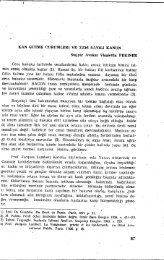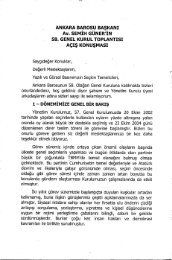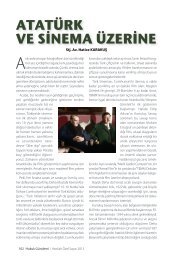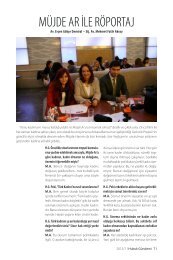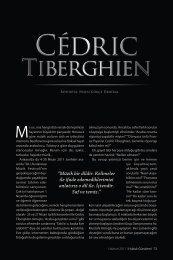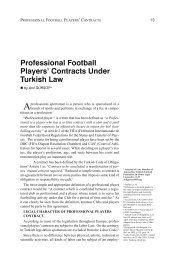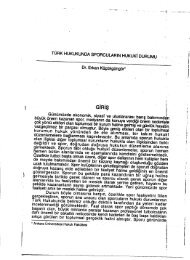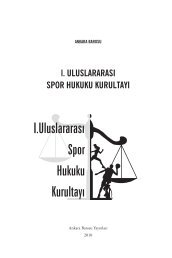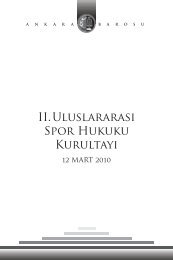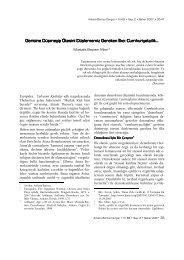The Turkish Cypriot Legal System from a Historical ... - Ankara Barosu
The Turkish Cypriot Legal System from a Historical ... - Ankara Barosu
The Turkish Cypriot Legal System from a Historical ... - Ankara Barosu
Create successful ePaper yourself
Turn your PDF publications into a flip-book with our unique Google optimized e-Paper software.
96<br />
ankarabarrevıew 2010/1<br />
the Kadis’ impartial decisions; they pursued justice without considering<br />
people’s ethnicity and religion. 18 <strong>The</strong> below given cases that are chosen<br />
<strong>from</strong> the Cyprus case history between 1725 and 1750 are good examples<br />
of the <strong>Turkish</strong> <strong>Cypriot</strong> legal system in the Ottoman Empire Era.<br />
<strong>The</strong> first given group of examples are chosen <strong>from</strong> family law. <strong>The</strong><br />
first example is an annulment of a marriage. <strong>The</strong> case was decided in<br />
1158 (Hegira Calendar) where Ali Aga, <strong>from</strong> the district Arab Ahmet<br />
of Nicosia and the son of Mustafa, went to the court to cancel his sister<br />
Serife Rabia’s marriage because his permission was not obtained as<br />
her guardian. <strong>The</strong> Kadi nullified the marriage due to the absence of<br />
the required permission <strong>from</strong> her guardian. 19 Another case is about<br />
a marriage which was forcibly entered into in 1146. Ali, the son of<br />
Ramazan, made a complaint to the court that he and Emine, the sister<br />
of Abdulkerim, were unable to cohabit as husband and wife because<br />
Emine kept running away <strong>from</strong> him although Emine’s consent was obtained<br />
at the marriage. However, Emine proved with witnesses in her<br />
plea that she never gave her consent to marry with Ali and rejected his<br />
brother’s consent request and authorization. Consequently, the Kadi<br />
nullified the marriage 20 .<br />
Before providing some examples of divorce cases, another group<br />
of cases <strong>from</strong> family law, it may be useful to touch on an interesting<br />
point: most lawyers assume that Islamic Law consists of rules regulating<br />
a male-dominated society, and it only protects men’s rights. When<br />
the court registers of Cyprus are analyzed, one can argue that it may<br />
not be so at least for the handling period’s divorce cases in Cyprus.<br />
<strong>The</strong>re are three types of divorces in Islamic Law: talak, muhalaa and<br />
tefrik 21 . Talak is a type of divorce where a man states his desire to get<br />
divorced by saying “I divorce you” three times to his wife; and subsequently<br />
the marriage ends. Muhalaa is a type of divorce where a woman<br />
renounces some of her marital rights and then gets divorced <strong>from</strong><br />
her husband. 22 <strong>The</strong>re were 278 divorce cases in the analyzed period<br />
in Cyprus, and 202 of those cases were muhalaa and only 73 of those<br />
were talak. Probably there is no other Muslim country during those<br />
days where the majority of the initiators of divorces were women. 23<br />
Also, another set of divorce cases confirm that not only the Muslims<br />
appealed to the Kadis but also the non-Muslims did so too. Fesonzo,<br />
a non-Muslim living in Camlica, Giriniyye, divorced her husband<br />
through a proxy (appointed by herself in front of Muslim witnesses)<br />
18 For instance, the Muslim judge of Kyrenia Ali Efendi-Zade Mehmet was convicted to the kalebent (the political prisoner<br />
confined to a fortress) for the offence of bribery and injustice decisions upon the Greeks citizens’ complaints; see<br />
Çiçek, pp. 63-64. See also ERDOĞRU, A.: Kıbrıs Ermenileri 1580-1640, Kıbrıs’da Osmanlılar, Lefkoşa 2008, p. 61.<br />
19 See ÖZKUL, p. 129.<br />
20 See ÖZKUL, pp. 129-130.<br />
21 See CİN, H.: İslam ve Osmanlı Hukukunda Boşanma, Konya 1988.<br />
22 See CİN, p. 122 et seq. for muhalla.<br />
23 See ÖZKUL p. 133.




